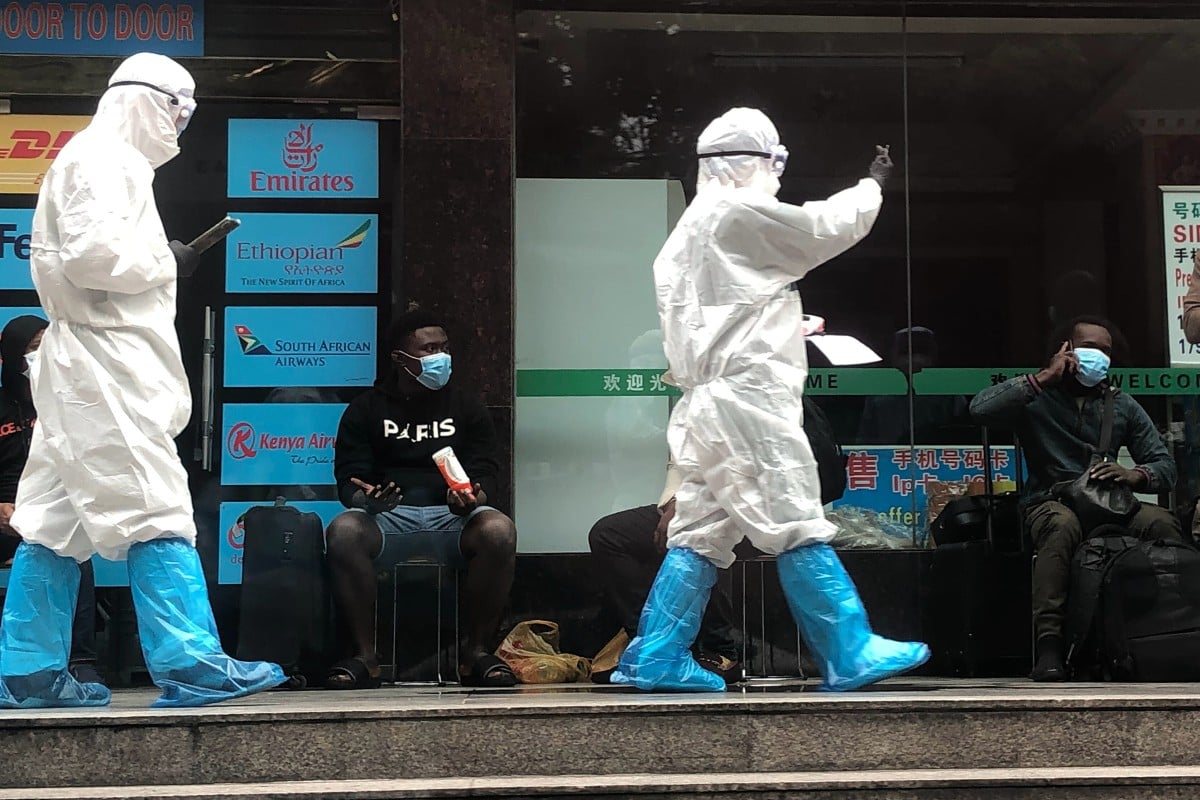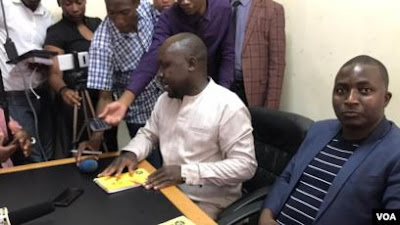
The recent photos, videos of
African nationals, living and/or working in China, being evicted from their
homes by landlords turned away from hotels, despite
many claiming to have no recent travel history or known contact with Covid-19
patients are quite disturbing. It’s disturbing because of the default assumption that COVID 19 started from outside China, yet it emerged from within
and the world had to burden with the containment strategy on the same.
In some of the videos, awash on
social media, African nationals can be seen being harassed by police and others
sleeping on the streets in the cold southern Chinese city of Guangzhou.
The unfortunate incidents have drawn ire from many parts of the continent
particularly on social media with African social media users taking turns to
attack the Chinese people, government over the racist and xenophobic actions
exhibited in Guangzhou. In this regard, civil society
organisations in Africa have launched a petition
to the African Union on Chinese mistreatment of Africans in China.
The Chinese government ought to be pressured to respond adequately and
in a manner that shows they acknowledge the problem at hand. So far, Beijing's responses have been inadequate,
unconvincing and insincere.
Incidentally,
American media and government found this as an opportune time to put a wedge
between China and Africa in their diplomatic rivalry and battle for political
and economic influence across Africa. A
statement from the US State Department said: "It's unfortunate but not
surprising to see this kind of xenophobia toward Africans by Chinese
authorities…Anyone who watches Chinese engagement in projects across Africa
recognises this kind of abusive and manipulative behaviour."
Several
African countries have remained mum except for a few who have released
statements in that regard. Countries like Nigeria, Uganda, South Africa and
Ghana to name a few have spoken out over what happened in China.
Zimbabwe,
a country that has aggressively pursued an active and engaged relationship with
China than other African states chose not to speak. However, the reactions so
far from African countries are weak and quite disappointing, they failed to hit
the bull straight in the eye.
It appears as if they are also
defending the actions of the Chinese. The responses by the African leadership are
worrisome as they confirm suspicions on shady deals that are happening at elite
levels without consent by African citizens.
In a
majority of the statements, no country dared challenge the Chinese government
to at least acknowledge and apologise for the barbaric behaviour towards
African nationals. Despite “expressing
concern” over the incidents, our inferiority complex was exposed. One country after the other re-emphasised on
the "excellent" relations dating back to the decolonisation project
in Africa. It cannot be business as usual and this is not a very good example
of excellent relations.
Posting
on his, Twitter handle yesterday April 13, 2020, the Chairperson of the African
Union Commission Moussa Faki Mahamat claimed that he had a phone call with
Chinese Foreign Minister Mr Wang Yi, who assured him of the measures underway in Guangzhou to improve the situation of Africans, in line with what
he termed “the strong and brotherly partnership between Africa and China.”
For how
long will Africa continue being beholden to China’s poisoned chalice, quoted in
“generosity”?
One would
have thought that Africa, through organised formations such as the
African Union and her sub-regional blocs should aim at advancing and protecting
its interests and that of its people first,
but it seems there is a challenge of protecting our sovereignty in the face of
a domineering imperial China.
In response, Chinese officials have repeatedly
denied the stigmatisation and mistreatment of African nationals despite the
overwhelming visuals of several of these incidents captured in Guangzhou.
Several Chinese diplomats accredited to Africa had a fair share denying the
allegations.
Consequently,
the official statement
made by Chinese Foreign Ministry spokesperson Zhao Lijian displayed sheer
arrogance lacked an acknowledgement of what had happened and bordered on
emotional blackmail.
While the
Chinese have been at pains to acknowledge the racial discrimination, McDonald's China apologised after a video went viral, of a
McDonald's employee in Guangzhou, China, holding up a sign that read: “From now
on black people are not allowed to enter the restaurant”.
Instead of
(1) issuing an apology, (2) an expression of regret (3) a commitment to
investigate the allegations (4) condemning the barbaric acts; the Chinese
Foreign Ministry went on counting fingers and toes on the number of African
countries they assisted. Overall, the response from China is disgusting,
arrogant lack sincerity and borders on a stinking superiority
complex with clear insinuations that China is doing Africa a big favour.
The
emphasis on mutual respect, brotherly love is not sincere as we have noticed
that the relations between China and Africa are not as even as mutual as the emphasis
being made.
What is
happening in Guangzhou is not new, racism against Africans once hogged the
limelight in 2013 and still, no decisive action was taken. Negative attitudes
toward the peoples of Nigeria have been
fuelled by their alleged involvement in drug-related crime in Guangzhou, which
is a rather low bar.
In a 2014 Al Jazeera report on African
migrants in Guangzhou, journalist Jennifer Marsh highlighted
the plight of African migrants. She noted that “While the central government
publicly welcomes the migrants, recent draconian visa legislation has sent a
clear signal: Africans in China - even highly prosperous, educated
economic contributors — are not welcome.”
This,
coupled with how the Chinese have treated Africans working for Chinese in
Africa in places like Nairobi and Addis Ababa shows a serious challenge in the
China-Africa relations. Several cases of racism, discrimination by the Chinese
people in Africa with an exceptional case of a
Chinese
boss in Kenya comparing Africans to monkeys.
China's
relations with Africa have changed over the past half-century. In the
decolonisation period, China played a critical role under the internationalism of its communist principles but as China emerges as a powerful
capitalist state the relations have changed. Under the latest phase,
China-Africa relations are now dominated by the search for natural
resources and markets for its goods, in turn, African economies are
loaded with debt and nationalist leaders are now shareholders in companies.
Thus, the weak statements from African countries point out to three fundamental
narratives, Firstly, the African elites are compromised and embedded in
the soft power cocoon at Chinese business relations level and as such
in most African countries, you would notice that much of the shareholdings are
between the Chinese and local elites. Secondly, the political party
relationship between the Chinese Communist Party and ruling parties in most
African countries are very cosy, the exchange programmes and scholarships that ruling
party activists in Africa have been enjoying makes them compromised. Thirdly,
African countries are benefitting from the Chinese Belt and Road
initiative with infrastructural developments with the construction of
airports, roads, railways and the telecommunications have left African leaders
compromised and in this case, they do not have the moral standing to challenge
China. The question is, are these relations simply going to be a replica of
what Walter Rodney in the book How Europe underdeveloped Africa said about
Europe: “It was economics that determined that Europe should invest in Africa
and control the continent’s raw materials and labour. It was racism which
confirmed the decision that the form of control should be direct colonial rule,”
and in this case China. Considering
the racism it seems Africa hasn't learnt anything from Walter Rodney.
However,
going forward, Africa (in particular the AU, regional bodies like ECOWAS, SADC,
EAC and the civil society) must compile and document the evidence of the abuse
of Africans in this regard and speak loudly against these abuses. South Africa’s president Cyril Ramaphosa, in
his capacity as the Chairperson of the African Union (AU), must show leadership
and demand a public apology from the Chinese government over the racial
xenophobic attacks committed in Guangzhou and other parts of China. China must
be forced to apologise and put in place clear measures to bring this barbarism
to an end before it escalates. There is a need for genuine engagements of both
parties to ensure peace to improve people to people relations based on genuine
mutual respect.
Further
to the afore-stated, the peoples of Africa need to increase muscle as the agency in
the holding of their respective political leaders through people to people
solidarity. This is the time to consider such a move especially when African
citizens are vulnerable in economic capitals with an enslaving mindset like
China. In essence, if the AU is to be considered a serious actor in the global
polity, it needs to move with speed to facilitate for the repatriation of
African citizens, despite its Headquarters in Addis Ababa being a donation from
China. Without citizen to citizen solidarity, Africans, you stand alone!
Blessing
Vava is a Doctoral candidate researching on China-Africa relations in the
School of Communications at the University
of Johannesburg. He writes in his personal capacity and can be contacted on
blessingvava@gmail.com





